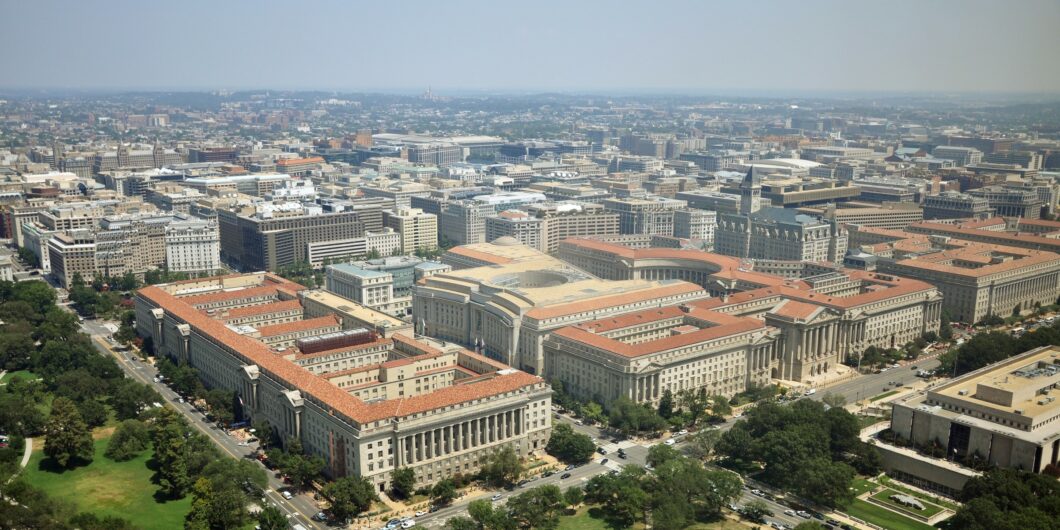It is modern liberalism, not classical liberalism, that blurs the distinction between the state and society, and that destroys ordered liberty.
Summoning Up the State
Every new regime not born from revolutionary violence must win the support of an elite to survive. Mere theories of sound social arrangements do not suffice. A powerful cohort must be invested in the regime’s success, ready to uphold its ideals. Lacking allies to enforce its vision, a regime’s framework may ironically undermine the principles it is designed to uphold. An entrenched opposing elite can turn the discretion inherent in all political settlements against the objectives of their proponents.
In American history, for instance, consider how a Federalist elite, entrenched in the federal judiciary, was able to preserve a Hamiltonian understanding of the Constitution and judicial role even against a widespread Jeffersonian revolt. But that was a contingent fact. If the legal elite had held antagonistic views, the Constitution would not likely have worked in practice, however good it was in theory.
Consider the contrast with today’s New Right which has grand ambitions but lacks an elite ready to back them. As a result, their program may be counterproductive, however laudable some of their goals are.
The New Right is opposed to the classical liberal right which has dominated the movement since the Reagan era. While the New Right contains many different strands and emphases, they share an interest, unlike classical liberals, in using and enlarging the scope of state power to pursue their ends. Many National Conservatives (Nat-Cons), for instance, want to raise tariffs and other trade barriers to protect domestic industry. They want to require public schools to teach a curriculum that celebrates American history and promotes family values. Some strands of the New Right, including senators like Josh Hawley, favor greater regulation to break up large companies and regulate social media.
Many, if not most, are fine with the larger administrative state that greater government intrusion for their desired ends will entail. Indeed, Adrian Vermeule’s most recent book, Common Good Constitutionalism, is a legal manifesto for a new conservative jurisprudence opposed to originalism, the jurisprudence identified with classical liberalism. It undergirds a vision of far more expansive and unrestrained state power that he hopes will serve a conservative, Christian moral and political order. Thus, while classical liberals want to constrain the modern administrative state, Vermeule celebrates its operation—including the delegation of substantial discretion to bureaucrats and relatively light judicial review of that discretion.
The desire to use state power, public schools, and administrative agencies for conservative purposes puts one in mind of Hotspur’s jibe in Shakespeare’s Henry IV. His ally Owen Glendower claims that he could summon “spirits from the vasty deep.” To this, Hotspur replies, “So can I or so can any man: But will they come when you do call for them?” The pursuit of the New Right’s goals would require a sympathetic elite to move its contemplated levers of power and it is unclear to say the least that they can be called forth today.
We know from studies that bureaucrats are very largely left-liberal Democrats. The bureaucracy holds views about the common good that are uncommon and distinctly uncongenial to the New Right.
Empowering the government to regulate big tech, for instance, may actually make it harder for conservatives to get out unorthodox views on social media. One reason that tech companies engage in content moderation at the behest of government is fear that government power will be used against them in the future if they do not comply. And the bureaucrats who control the day-to-day operation of that power are hostile to the New Right.
It is true that the bureaucracy is subject to political control, but that control is imperfect as political appointees must compromise with the bureaucracy to get things done. And thus, the bureaucracy has an enduring influence, even when (as will not always be the case in a two-party system) the President is sympathetic to the New Right.
Paradoxically, an intensification of the classical liberal program may be more likely to achieve indirectly the objectives of the New Right than its own misguided program for more state power.
One response is to give more power to the government to fire bureaucrats. In the waning days of his administration, President Trump suggested new a Schedule F designation for thousands of civil servants who influence policy. Those so designated would lose traditional job protections and could be easily fired by administrations who found them unsympathetic. President Biden has recently countered with a formal rule making it harder to fire these civil servants, impeding the kind of restructuring Trump sought. But even if the bureaucracy lost civil servant protections and could be replaced, who would replace it? The kind of people with the qualifications and the interest to be in the bureaucracy are unlikely to work for this new regime.
This weakness would exacerbate a problem of competence already evident in a populist administration like Trump’s. For instance, agencies were not careful in two key administrative law decisions—one on counting illegal immigrants in the census and another in reversing DAPA (Deferred Actions for Parents of Americans or Lawful Permanent Residents). As a result, the Supreme Court found procedural errors in the decision-making. Lack of competence is another form of counterproductivity, alienating support.
Expanding regulations empowers not only government adversaries but also those within the corporate sphere. More red tape means more power for lawyers, rather than producers. For instance, the greater the scope for antitrust law, the more executives must share decision-making about key business matters with lawyers. Lawyers and compliance officers, moreover, lean left more than the business executives. They affect the culture of the corporation they inhabit, making it, for instance, more likely to support left-liberal corporate initiatives, like DEI and ESG in our day.
Those who influence and direct public education—teachers, teacher union officials, and ed-school faculty—are also not well disposed toward the goals of the New Right. And it is much harder to monitor what teachers do in the classroom than what civil servants do in the bureaucracy. It is also difficult to fire teachers, particularly given the national teacher shortage. The result is a scholastic front where the message of the New Right will struggle to take root. Some more sophisticated supporters of a new conservative movement have recognized that it is impossible to govern without elites. Patrick Deneen, for instance, in his recent book Regime Change: Toward a Postliberal Future, calls for an “aristopopulism” led by a new elite in concert with the working class to replace our current order. But Deneen is not at all clear about where he will find this elite, making his argument particularly susceptible to Hotspur’s retort.
When nineteenth-century counterparts of today’s New Right, like Joseph De Maistre, offered an alternative to bourgeois classical liberalism, they could call on the remnants of an established hierarchy in Europe to counter the entire liberal project—those connected to the throne and altar. And even if there was no king in the United States, organized religion had substantial sway. But traditional hierarchies have far less influence today. The aristocracy of Europe is gone and the WASP hierarchy that was once important to American social governance is no longer ascendant. The most substantial and organized of religions—the Catholic Church—is riven against itself with conservative and liberal factions in disagreement on social issues from same-sex marriage to capitalism. The Evangelicals have no formal structure and currently lack the intellectual reach into political discourse of previous elites.
As a result of the New Right’s mismatch problem, an intensification of the classical liberal program may paradoxically be more likely to achieve indirectly the objectives of the New Right than its own misguided program for more state power. For instance, if the momentum of school choice programs continues, competition may naturally deliver a more patriotic and family-friendly education than government schools, because that is what most parents want. The policy matches sociology: school choice empowers a group more friendly to the New Right (parents) and disempowers a group (teachers—who are more hostile to it).
Similarly, a program of deregulation disempowers bureaucracy and groups within a corporation that are hostile to conservative views. The result is likely to be a less woke corporate world. To be sure, this alignment with New Right objectives is not perfect. A classical liberal regime allows much more room for dissenters from patriotism and family values. But it also seems more likely to generate an elite on which the New Right can then build. In any event, America’s new forms of conservativism should realize that without appealing for support from a relevant, existing elite, they are erecting an elaborate new edifice on sand.


